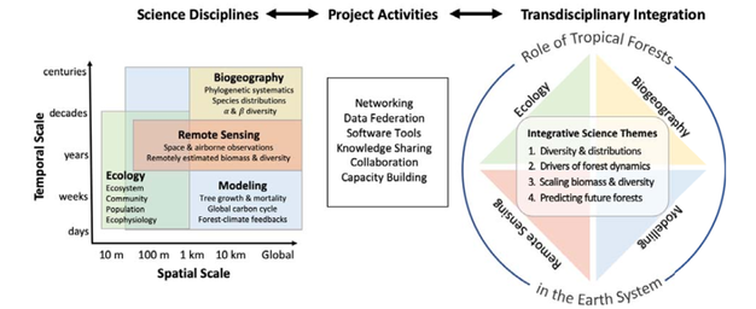The diversity, structure, functioning and dynamics of tropical forests are currently being investigated by four largely independent scientific disciplines:
These disciplines operate at different but complementary spatial and temporal scales. Biogeography seeks to understand patterns of tropical diversity at large scales of space and time and how these patterns are being perturbed by global changes. Operating at smaller scales of space and time, ecology seeks to understand the mechanisms underlying these diversity patterns, integrating individual and population-level processes, as well as structure-function relationships to understand forest communities and the fluxes of matter and energy in them. Remote sensing has the power to scale-up ecological processes to describe how they drive regional to global-scale forest properties, such as biomass and carbon storage of tropical forests. Modeling approaches seek to synthesize all of these sources of information, culminating in Earth systems models that predict the long-term dynamics of tropical forests and their atmospheric and biogeochemical feedbacks.
ATFS aims to integrate among these disciplines to achieve novel inferences about tropical forests that will accelerate our understanding of their role in the functioning of the Earth System.
- Biogeography
- Ecology
- Remote sensing
- Modeling
These disciplines operate at different but complementary spatial and temporal scales. Biogeography seeks to understand patterns of tropical diversity at large scales of space and time and how these patterns are being perturbed by global changes. Operating at smaller scales of space and time, ecology seeks to understand the mechanisms underlying these diversity patterns, integrating individual and population-level processes, as well as structure-function relationships to understand forest communities and the fluxes of matter and energy in them. Remote sensing has the power to scale-up ecological processes to describe how they drive regional to global-scale forest properties, such as biomass and carbon storage of tropical forests. Modeling approaches seek to synthesize all of these sources of information, culminating in Earth systems models that predict the long-term dynamics of tropical forests and their atmospheric and biogeochemical feedbacks.
ATFS aims to integrate among these disciplines to achieve novel inferences about tropical forests that will accelerate our understanding of their role in the functioning of the Earth System.
Progress in each of these four disciplines depends critically on long-term, field-based, observations of tropical forests across the globe. Biogeographic studies require extensive ground data on species locations through space and time. Because forests are comprised of many long-lived organisms that interact in complex ways, ecological understanding requires long time-series of spatially explicit field observations. To bridge biogeography and ecology, remote-sensing studies need spatially explicit ground-based observations to calibrate and validate air- and space-borne observations. Finally, robust models of tropical forest diversity and dynamics require both improved process-level knowledge, as well as empirical benchmarks against which to test and validate model predictions.
The fundamental requirement for progress in each of these science disciplines, as well as the integration among them, is long-term observations of tropical forests. These observations exist and are managed by 11 tropical forest plot networks. ATFS will bring these networks together to leverage their respective and considerable resources, knowledge, and data.
The fundamental requirement for progress in each of these science disciplines, as well as the integration among them, is long-term observations of tropical forests. These observations exist and are managed by 11 tropical forest plot networks. ATFS will bring these networks together to leverage their respective and considerable resources, knowledge, and data.
